TED演讲中英对照3
- 格式:doc
- 大小:57.00 KB
- 文档页数:16
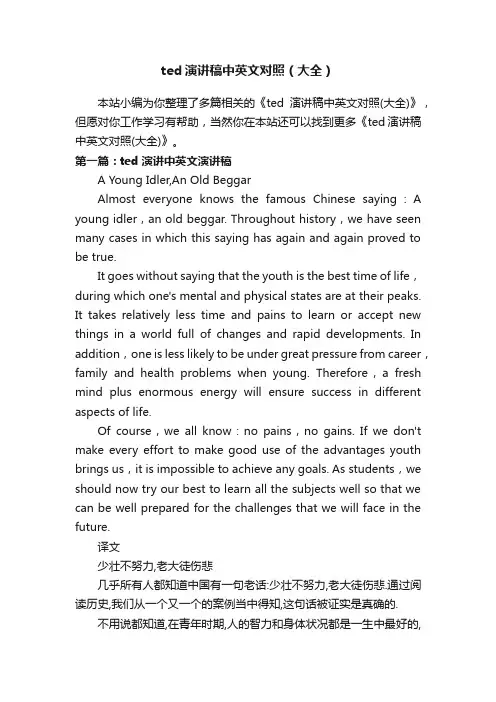
ted演讲稿中英文对照(大全)本站小编为你整理了多篇相关的《ted演讲稿中英文对照(大全)》,但愿对你工作学习有帮助,当然你在本站还可以找到更多《ted演讲稿中英文对照(大全)》。
第一篇:ted演讲中英文演讲稿A Young Idler,An Old BeggarAlmost everyone knows the famous Chinese saying:A young idler,an old beggar. Throughout history,we have seen many cases in which this saying has again and again proved to be true.It goes without saying that the youth is the best time of life,during which one's mental and physical states are at their peaks. It takes relatively less time and pains to learn or accept new things in a world full of changes and rapid developments. In addition,one is less likely to be under great pressure from career,family and health problems when young. Therefore,a fresh mind plus enormous energy will ensure success in different aspects of life.Of course,we all know:no pains,no gains. If we don't make every effort to make good use of the advantages youth brings us,it is impossible to achieve any goals. As students,we should now try our best to learn all the subjects well so that we can be well prepared for the challenges that we will face in the future.译文少壮不努力,老大徒伤悲几乎所有人都知道中国有一句老话:少壮不努力,老大徒伤悲.通过阅读历史,我们从一个又一个的案例当中得知,这句话被证实是真确的.不用说都知道,在青年时期,人的智力和身体状况都是一生中最好的,这也是一个人一生中最好的时期.在这个处处都不停地转变,飞快地发展的世界里,年轻使人相对地用更少的时间去学习和领悟新知.在这时,很少人会困在从事业上来的压力下,家庭和健康问题也比较小(就是说不是没有--译者).所以,一个清醒的脑袋加上巨大的能量就会成就人生中不同方面的成功.当然,我们都知道:没有挫折就没有获得.如果我们没有好好努力去利用年轻带给我们的优胜之处,那就没有可能获得任何的成功.作为中学生,我们应该做到最好去学好每一个科目,这样的话,我们就可以为将来即将面对的挑战做好准备.。
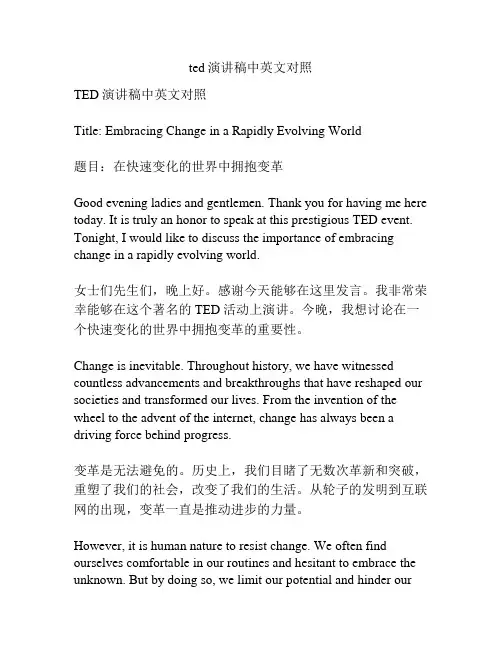
ted演讲稿中英文对照TED演讲稿中英文对照Title: Embracing Change in a Rapidly Evolving World题目:在快速变化的世界中拥抱变革Good evening ladies and gentlemen. Thank you for having me here today. It is truly an honor to speak at this prestigious TED event. Tonight, I would like to discuss the importance of embracing change in a rapidly evolving world.女士们先生们,晚上好。
感谢今天能够在这里发言。
我非常荣幸能够在这个著名的TED活动上演讲。
今晚,我想讨论在一个快速变化的世界中拥抱变革的重要性。
Change is inevitable. Throughout history, we have witnessed countless advancements and breakthroughs that have reshaped our societies and transformed our lives. From the invention of the wheel to the advent of the internet, change has always been a driving force behind progress.变革是无法避免的。
历史上,我们目睹了无数次革新和突破,重塑了我们的社会,改变了我们的生活。
从轮子的发明到互联网的出现,变革一直是推动进步的力量。
However, it is human nature to resist change. We often find ourselves comfortable in our routines and hesitant to embrace the unknown. But by doing so, we limit our potential and hinder ourgrowth both individually and as a society.然而,抵制变革是人类的本性。
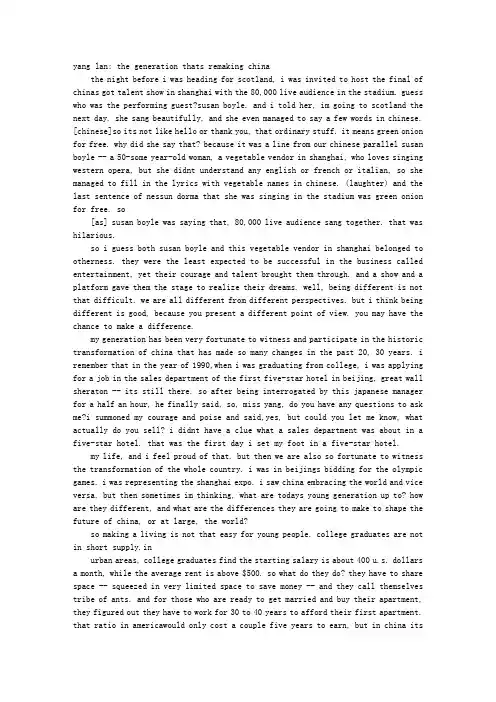
yang lan: the generation thats remaking china the night before i was heading for scotland, i was invited to host the final ofchinas got talent show in shanghai with the 80,000 live audience in the stadium. guesswho was the performing guest?susan boyle. and i told her, im going to scotland thenext day. she sang beautifully, and she even managed to say a few words in chinese.[chinese]so its not like hello or thank you, that ordinary stuff. it means green onionfor free. why did she say that? because it was a line from our chinese parallel susanboyle -- a 50-some year-old woman, a vegetable vendor in shanghai, who loves singingwestern opera, but she didnt understand any english or french or italian, so shemanaged to fill in the lyrics with vegetable names in chinese. (laughter) and thelast sentence of nessun dorma that she was singing in the stadium was green onionfor free. so[as] susan boyle was saying that, 80,000 live audience sang together. that washilarious.so i guess both susan boyle and this vegetable vendor in shanghai belonged tootherness. they were the least expected to be successful in the business calledentertainment, yet their courage and talent brought them through. and a show and aplatform gave them the stage to realize their dreams. well, being different is notthat difficult. we are all different from different perspectives. but i think beingdifferent is good, because you present a different point of view. you may have thechance to make a difference. my generation has been very fortunate to witness and participate in the historictransformation of china that has made so many changes in the past 20, 30 years. iremember that in the year of 1990,when i was graduating from college, i was applyingfor a job in the sales department of the first five-star hotel in beijing, great wallsheraton -- its still there. so after being interrogated by this japanese managerfor a half an hour, he finally said, so, miss yang, do you have any questions to askme?i summoned my courage and poise and said,yes, but could you let me know, whatactually do you sell? i didnt have a clue what a sales department was about in afive-star hotel. that was the first day i set my foot in a five-star hotel. my life, and i feel proud of that. but then we are also so fortunate to witnessthe transformation of the whole country. i was in beijings bidding for the olympicgames. i was representing the shanghai expo. i saw china embracing the world and viceversa. but then sometimes im thinking, what are todays young generation up to? howare they different, and what are the differences they are going to make to shape thefuture of china, or at large, the world? so making a living is not that easy for young people. college graduates are notin short supply.in urban areas, college graduates find the starting salary is about 400 u.s. dollarsa month, while the average rent is above $500. so what do they do? they have to sharespace -- squeezed in very limited space to save money -- and they call themselvestribe of ants. and for those who are ready to get married and buy their apartment,they figured out they have to work for 30 to 40 years to afford their first apartment.that ratio in americawould only cost a couple five years to earn, but in china its30 to 40 years with the skyrocketing real estate price. so through some of the hottest topics on microblogging, we can see what youngpeople care most about. social justice and government accountability runs the firstin what they demand.for the past decade or so, a massive urbanization and developmenthave let us witness a lot of reports on the forced demolition of private property.andit has aroused huge anger and frustrationamong our young generation. sometimes peopleget killed, and sometimes people set themselves on fire to protest. so when theseincidents are reported more and more frequently on the internet,people cry for thegovernment to take actions to stop this. so the good news is that earlier this year, the state council passed a newregulation on house requisition and demolition and passed the right to order forceddemolition from local governments to the court. similarly, many other issues concerning public safety is a hot topicon the internet. we heard about polluted air, polluted water, poisoned food. and guesswhat, we have faked beef. they have sorts of ingredients that you brush on a pieceof chicken or fish, and it turns it to look like beef.and then lately, people arevery concerned about cooking oil, because thousands of people have been found[refining] cooking oil from restaurant slop. so all these things have aroused a hugeoutcry from the internet. and fortunately, we have seen the government respondingmore timely and also more frequently to the public concerns. while young people seem to be very sure about their participation in publicpolicy-making, but sometimes theyre a little bit lost in terms of what they want fortheir personal life. china is soon to pass the u.s. as the number one market for luxurybrands -- thats not including the chinese expenditures in europe and elsewhere. butyou know what, half of those consumers are earning a salary below 2,000 u.s. dollars.theyre not rich at all. theyre taking those bags and clothes as a sense of identityand social status. and this is a girl explicitly saying on a tv dating show that shewould rather cry in a bmw than smile on a bicycle.but of course, we do have youngpeople who would still prefer to smile, whether in a bmw or [on] a bicycle. so happiness is the most popular word we have heard through the past two years.happiness is not only related to personal experiences and personal values, but also,its about the environment. people are thinking about the following questions: arewe going to sacrifice our environment further to produce higher gdp? how are we goingto perform our social and political reform to keep pace with economic growth, to keepsustainability and stability? and also, how capable is the systemof self-correctnessto keep more people contentwith all sorts of friction going on at the same time?iguess these are the questions people are going to answer. and our younger generationare going to transform this country while at the same time being transformedthemselves.thank you very much.杨澜ted演讲:重塑中国的一代中文演讲稿在来爱尔兰的前一晚,我应邀主持了中国达人秀在上海的体育场和八万现场观众。
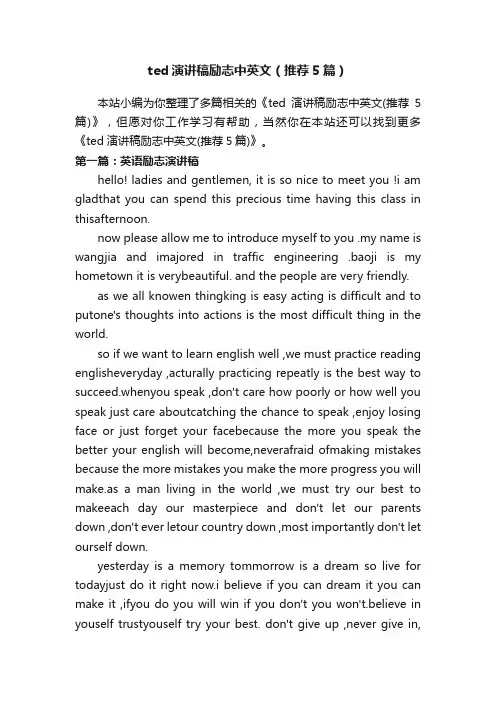
ted演讲稿励志中英文(推荐5篇)本站小编为你整理了多篇相关的《ted演讲稿励志中英文(推荐5篇)》,但愿对你工作学习有帮助,当然你在本站还可以找到更多《ted演讲稿励志中英文(推荐5篇)》。
第一篇:英语励志演讲稿hello! ladies and gentlemen, it is so nice to meet you !i am gladthat you can spend this precious time having this class in thisafternoon.now please allow me to introduce myself to you .my name is wangjia and imajored in traffic engineering .baoji is my hometown it is verybeautiful. and the people are very friendly.as we all knowen thingking is easy acting is difficult and to putone's thoughts into actions is the most difficult thing in the world.so if we want to learn english well ,we must practice reading englisheveryday ,acturally practicing repeatly is the best way to succeed.whenyou speak ,don't care how poorly or how well you speak just care aboutcatching the chance to speak ,enjoy losing face or just forget your facebecause the more you speak the better your english will become,neverafraid ofmaking mistakes because the more mistakes you make the more progress you will make.as a man living in the world ,we must try our best to makeeach day our masterpiece and don't let our parents down ,don't ever letour country down ,most importantly don't let ourself down.yesterday is a memory tommorrow is a dream so live for todayjust do it right now.i believe if you can dream it you can make it ,ifyou do you will win if you don't you won't.believe in youself trustyouself try your best. don't give up ,never give in,never lose hope ,never say impossible .the success is coming ! thank you !第二篇:英语励志演讲稿范文ladies and gentlemen , good afternoon! i’m very glad to stand here and give you a short speech. today my topic is “youth”. i hope you will like it , and found the importance in your youth so that more cherish it.first i want to ask you some questions:1、do you know what is youth?2、how do you master your youth?youthyouth is not a time of life, it is a state of mind ; it is not rosy cheeks , red lips and supple knees, it is a matter of the emotions : it is the freshness ; it is the freshness of the deep springs of life .youth means a temperamental predominance of courage over timidity of the appetite , for adventure over the love of ease. this often exists in a man of 60 more than a boy of 20 . nobody grows old merely by a number of years . we grow old by deserting our ideals.years wrinkle the skin , but to give up enthusiasm wrinkles the soul . worry , fear , self –distrust bows the heart and turns the spirit back to dust .whether 60 of 16 , there is in every human being ‘s heart the lure of wonders, the unfailing childlike appetite of what’s next and the joy of the game of living . in the center of your heart and my heart there’s a wireless station : so long as it receives messages of beauty , hope ,cheer, courage and power from men and from the infinite, so long as you are young .when the aerials are down , and your spirit is covered with snows of cynicism and the ice of pessimism, then you are grownold ,even at 20 , but as long as your aerials are up ,to catch waves of optimism , there is hope you may die young at 80.thank you!第三篇:英语励志演讲稿范文We all come to the world, but why do some of us make great achievements known forever and why are they remembered forever even though they leave the world? And why do some leave the world without anything valuable to his generation and the people? Every one of us will hope to have a significant and valuable life. But what kind of life is both significant and valuable? Answers to the questions ar e …… "If you cherish your value of your own life, you will create something valuable for the world." Johann Goth said. "The life value should be judged from his contribution rather than his profession." Einstein said. Lei Feng, a communist soldier, said, "one lives to make others a more beautiful life."As we all know, Marx is an outstanding and great man. He founded his brilliant and scientific theory of communism. The theory guides the ways for the human being's liberation. Marx said, "If we can elect one suitable profession, we won't be demoralized with its pressure, because we make sacrifice for human beings. Only by this way will we not be addicted to the joy of narrow-minded and individualism. Our happiness belongs to thousands upon thousands of people. I see, although it may be unknown, our cause will never be forgot forever. Even when we depart to God, the kind people will tear down upon our ashes." When he said these words, he was only 17 years old. He meant his word with his deeds in his late lifetime period. After his death, on his 100-birthday anniversary, the proletarian and the revolutionary people of the whole world still cherish the memoryof Marx and mourn him respectively.It is his distinguishingable contribution to the mankind that his life is that significant. It is his great devotion to the human being that his life value is beyond measure. We also know that Lu Xun is a man of great. Without his nobility "Fierce-browed, I wooly defy a thousand point fingers, head bowed like a willing ox I serve the children", and without his spirit of his loyalty and devotion to the last for the bright future of the Chinese people, his life would not have been so significant and so great. Actually, didn't those regarded as essence of human who live forever in the hearts of people make great contributions to the cause of the people? Wouldn't the people remember those whose great achievements for human are recorded in history? We know for certain that not every of us will be a second Marx or Lu Xun. However, a person of noble aspirations will do solid work. Strugglecontinuously and effortless. He will try to make his greatest contribution in his shortest time. He will try what he can to bring benefit to the people in his lifetime. We'd say it is impossible for one to live alone if he isolates society and people. If he hopes to make a benefit life, he will bring benefit and make contribution to people. As a socialist youth, he will devote his life to the cause of communism in order to make a benefit life. Moreover, we say that a value of life will be only in direct proportion to achievement and contribution he makes to our society. In our real life, we can see many revolutionary martyrs die young for the people. Don't you think they cherish the life? Yes. They do. They are sentimentally attached to life; they are full of hope and desire. But they confront the death bravely and resolutely in order to make many more people live. Their brilliant status will be livingin the hearts of people. They die glorious and great.The life of those who die busy about his lifetime without any achievements can not be compared with their life. In our real life, we have many cases like those. Life is endless and tackling key problems will be continuous. Let's take these as examples. Mr. Jing Zhuying worked for the Chinese science causes to the last of his life. Mr. Zhang Hua sacrificed his own young life for the sake of others, which set a good example of the communist. Mr. An Ke died for fulfillment for the duty as a citizen. Ms Zhang Haiti, compared to be Paul of our time, worked very hard and faced frustrations of her life, though she was disabled. She still continues to live on bravely.All these are the strong of their life. Their value of life is precious. My fellow students, don't you say what a beautiful life they have? Beethoven once said; "I must learn to control my life which will never make me give myself up. Oh, If only I can live more than thousands times!" Paul Cocking also had a golden saying, "Life is but one." I think every youth of us keep this in our minds. let's turn it into reality with our deeds.Let's not be a man full of promises but without any deeds, like Lusting, one of the characters by Dougeshefol. My fellow students, let's not wander. Let's not hesitate. Only lament and vexation does not mean consideration and exploration. Only lament and vexation does not mean advancing and does not mean mature at all. Let's not kill our lifetime by playing cards. Let's not waste our youth by drinking. Let's not destroy our will without any achievements. Let's make great contribution to human. And only by these can we create benefit life. Every one will have to die and every body will be rotten. But every one may make achievements and contributions. We hate being rotten.Let's brighten up! Up! And up!第四篇:青春励志英语演讲稿带中文翻译We Are The World ,We Are The FutureSomeone said "we are reading the first verse of the first chapter of a book, whose pages are infinite". I don’t know who wrote these words, but I’ve always liked them as a reminder that the future can be anything we want it to be. We are all in the position of the farmers. If we plant a good seed ,we reap a good harvest. If we plant nothing at all, we harvest nothing at all.We are young. "How to spend the youth?" It is a meaningful question. T o answer it, first I have to ask "what do you understand by the word youth?" Youth is not a time of life, it’s a state of mind. It’s not a matter of rosy cheeks, red lips or supple knees. It’s the matter of the will. It’s the freshness of the deep spring of life.A poet said "To see a world in a grain of sand, and a heaven in a wild flower, hold infinity in the palm of your hand, and eternity in an hour. Several days ago, I had a chance to listen to a lecture. I learnt a lot there. I’d l ike to share it with all of you. Let’s show our right palms. We can see three lines that show how our love.career and life is. I have a short line of life. What about yours? I wondered whether we could see our future in this way. Well, let’s make a fist. W here is our future? Where is our love, career, and life? Tell me.Yeah, it is in our hands. It is held in ourselves.We all want the future to be better than the past. But the future can go better itself. Don’t cry because it is over, smile because it happe ned. From the past, we’ve learnt that the life is tough, but we are tougher. We’ve learnt that we can’t choose how we feel, but we can choose what about it. Failure doesn’tmean you don’t have it, it does mean you should do it in a different way. Failure d oesn’t mean you should give up, it does mean you must try harder.As what I said at the beginning, "we are reading the first verse of the first chapter of a book, whose pages are infinite". The past has gone. Nothing we do will change it. But the future is in front of us. Believe that what we give to the world, the world will give to us. And from today on, let’s be the owners of ourselves, and speak out "We are the world, we are the future."世界是我们的,未来是我们的一些人说"我们正在读一本无穷的书中的第一章的第一节。
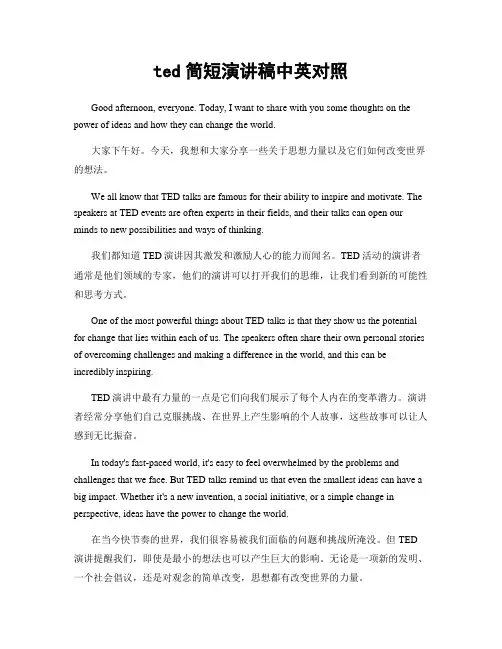
ted简短演讲稿中英对照Good afternoon, everyone. Today, I want to share with you some thoughts on the power of ideas and how they can change the world.大家下午好。
今天,我想和大家分享一些关于思想力量以及它们如何改变世界的想法。
We all know that TED talks are famous for their ability to inspire and motivate. The speakers at TED events are often experts in their fields, and their talks can open our minds to new possibilities and ways of thinking.我们都知道TED演讲因其激发和激励人心的能力而闻名。
TED活动的演讲者通常是他们领域的专家,他们的演讲可以打开我们的思维,让我们看到新的可能性和思考方式。
One of the most powerful things about TED talks is that they show us the potential for change that lies within each of us. The speakers often share their own personal stories of overcoming challenges and making a difference in the world, and this can be incredibly inspiring.TED演讲中最有力量的一点是它们向我们展示了每个人内在的变革潜力。
演讲者经常分享他们自己克服挑战、在世界上产生影响的个人故事,这些故事可以让人感到无比振奋。
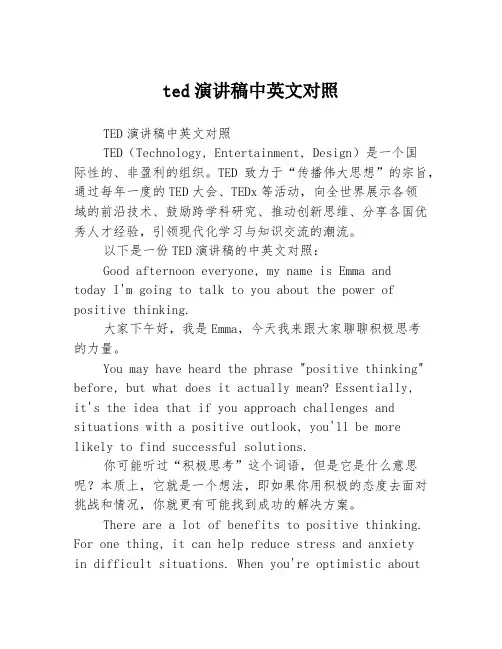
ted演讲稿中英文对照TED演讲稿中英文对照TED(Technology, Entertainment, Design)是一个国际性的、非盈利的组织。
TED致力于“传播伟大思想”的宗旨,通过每年一度的TED大会、TEDx等活动,向全世界展示各领域的前沿技术、鼓励跨学科研究、推动创新思维、分享各国优秀人才经验,引领现代化学习与知识交流的潮流。
以下是一份TED演讲稿的中英文对照:Good afternoon everyone, my name is Emma andtoday I'm going to talk to you about the power of positive thinking.大家下午好,我是Emma,今天我来跟大家聊聊积极思考的力量。
You may have heard the phrase "positive thinking" before, but what does it actually mean? Essentially,it's the idea that if you approach challenges and situations with a positive outlook, you'll be more likely to find successful solutions.你可能听过“积极思考”这个词语,但是它是什么意思呢?本质上,它就是一个想法,即如果你用积极的态度去面对挑战和情况,你就更有可能找到成功的解决方案。
There are a lot of benefits to positive thinking. For one thing, it can help reduce stress and anxietyin difficult situations. When you're optimistic aboutan outcome, you're less likely to feel overwhelmed or discouraged by setbacks.积极思考有很多好处。
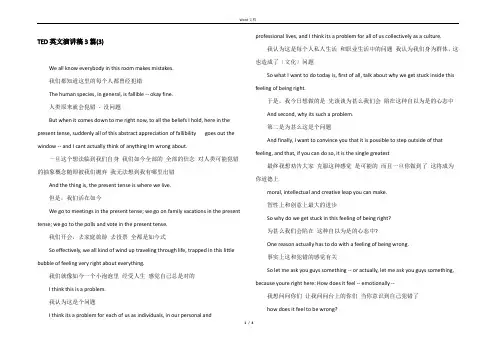
TED英文演讲稿3篇(3)We all know everybody in this room makes mistakes.我们都知道这里的每个人都曾经犯错The human species, in general, is fallible -- okay fine.人类原来就会犯错-没问题But when it comes down to me right now, to all the beliefs I hold, here in the present tense, suddenly all of this abstract appreciation of fallibility goes out the window -- and I cant actually think of anything Im wrong about.一旦这个想法临到我们自身我们如今全部的全部的信念对人类可能犯错的抽象概念随即被我们抛弃我无法想到我有哪里出错And the thing is, the present tense is where we live.但是,我们活在如今We go to meetings in the present tense; we go on family vacations in the present tense; we go to the polls and vote in the present tense.我们开会,去家庭旅游去投票全都是如今式So effectively, we all kind of wind up traveling through life, trapped in this little bubble of feeling very right about everything.我们就像如今一个小泡泡里经受人生感觉自己总是对的I think this is a problem.我认为这是个问题I think its a problem for each of us as individuals, in our personal and professional lives, and I think its a problem for all of us collectively as a culture.我认为这是每个人私人生活和职业生活中的问题我认为我们身为群体,这也造成了〔文化〕问题So what I want to do today is, first of all, talk about why we get stuck inside this feeling of being right.于是,我今日想做的是先谈谈为甚么我们会陷在这种自以为是的心态中And second, why its such a problem.第二是为甚么这是个问题And finally, I want to convince you that it is possible to step outside of that feeling, and that, if you can do so, it is the single greatest最终我想劝告大家克服这种感觉是可能的而且一旦你做到了这将成为你道德上moral, intellectual and creative leap you can make.智性上和创意上最大的进步So why do we get stuck in this feeling of being right?为甚么我们会陷在这种自以为是的心态中?One reason actually has to do with a feeling of being wrong.事实上这和犯错的感觉有关So let me ask you guys something -- or actually, let me ask you guys something, because youre right here: How does it feel -- emotionally --我想问问你们让我问问台上的你们当你意识到自己犯错了how does it feel to be wrong?你感觉如何?Dreadful. Thumbs down.糟透了。
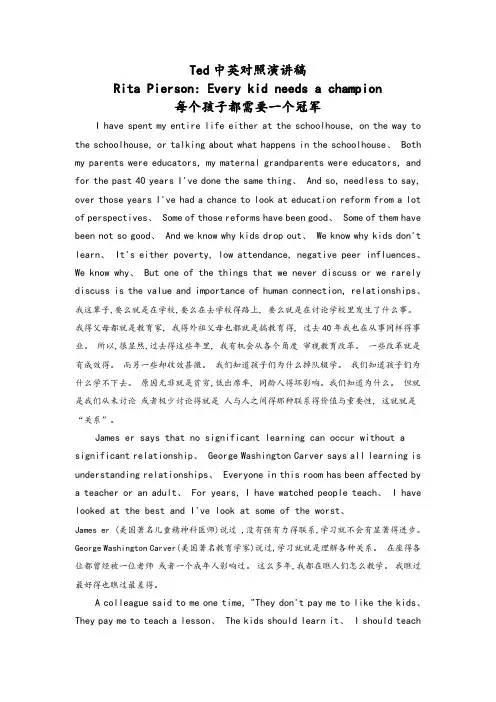
Ted中英对照演讲稿Rita Pierson: Every kid needs a champion每个孩子都需要一个冠军I have spent my entire life either at the schoolhouse, on the way to the schoolhouse, or talking about what happens in the schoolhouse、 Both my parents were educators, my maternal grandparents were educators, and for the past 40 years I've done the same thing、 And so, needless to say, over those years I've had a chance to look at education reform from a lot of perspectives、 Some of those reforms have been good、 Some of them have been not so good、 And we know why kids drop out、 We know why kids don't learn、 It's either poverty, low attendance, negative peer influences、We know why、 But one of the things that we never discuss or we rarely discuss is the value and importance of human connection, relationships、我这辈子,要么就是在学校,要么在去学校得路上, 要么就是在讨论学校里发生了什么事。
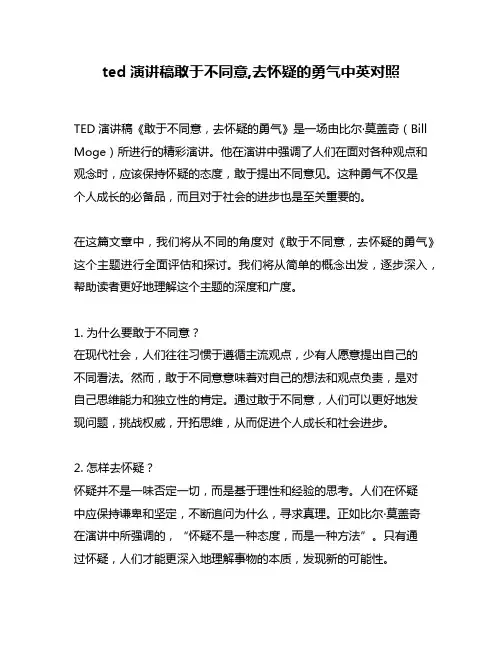
ted演讲稿敢于不同意,去怀疑的勇气中英对照TED演讲稿《敢于不同意,去怀疑的勇气》是一场由比尔·莫盖奇(Bill Moge)所进行的精彩演讲。
他在演讲中强调了人们在面对各种观点和观念时,应该保持怀疑的态度,敢于提出不同意见。
这种勇气不仅是个人成长的必备品,而且对于社会的进步也是至关重要的。
在这篇文章中,我们将从不同的角度对《敢于不同意,去怀疑的勇气》这个主题进行全面评估和探讨。
我们将从简单的概念出发,逐步深入,帮助读者更好地理解这个主题的深度和广度。
1. 为什么要敢于不同意?在现代社会,人们往往习惯于遵循主流观点,少有人愿意提出自己的不同看法。
然而,敢于不同意意味着对自己的想法和观点负责,是对自己思维能力和独立性的肯定。
通过敢于不同意,人们可以更好地发现问题,挑战权威,开拓思维,从而促进个人成长和社会进步。
2. 怎样去怀疑?怀疑并不是一味否定一切,而是基于理性和经验的思考。
人们在怀疑中应保持谦卑和坚定,不断追问为什么,寻求真理。
正如比尔·莫盖奇在演讲中所强调的,“怀疑不是一种态度,而是一种方法”。
只有通过怀疑,人们才能更深入地理解事物的本质,发现新的可能性。
3. 敢于不同意的意义在社会发展和个人成长中,敢于不同意具有重要意义。
它可以激发创新和变革。
历史上许多伟大的发明和发现都来自于对传统观念的挑战。
敢于不同意可以促进多元文化的交流和包容。
当人们敢于提出自己的意见时,就有可能更好地理解和尊重不同文化之间的差异。
敢于不同意可以培养个人的独立思考能力和自信心,让人更加坚定地走自己的道路。
从个人的角度来看,《敢于不同意,去怀疑的勇气》主题对我来说意义重大。
在我的学习和工作中,我常常遇到各种各样的观点和问题,而敢于不同意让我敢于提出自己的见解,并且在怀疑中不断地思考,从而取得了不少收获。
总结回顾,敢于不同意、去怀疑的勇气是一种重要的品质,它不仅对个人成长有益,而且对社会的发展具有重要意义。
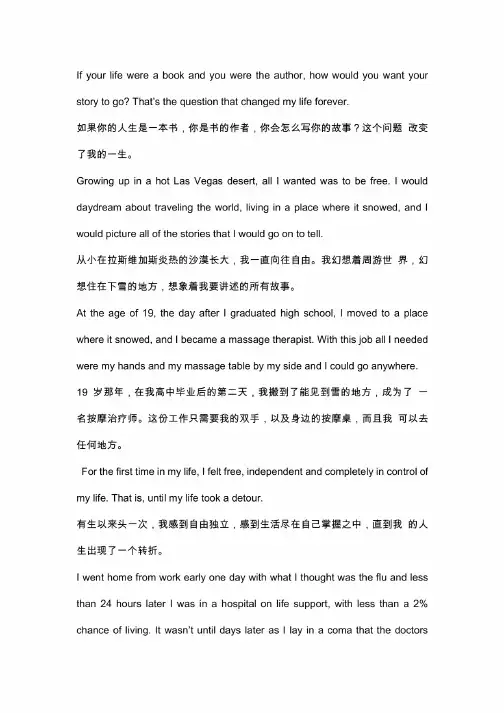
If your life were a book and you were the author,how would you want your story to go?That's the question that changed my life forever.如果你的人生是一本书,你是书的作者,你会怎么写你的故事?这个问题改变了我的一生。
Growing up in a hot Las Vegas desert,all I wanted was to be free.I would daydream about traveling the world,living in a place where it snowed,and I would picture all of the stories that I would go on to tell.从小在拉斯维加斯炎热的沙漠长大,我一直向往自由。
我幻想着周游世界,幻想住在下雪的地方,想象着我要讲述的所有故事。
At the age of19,the day after I graduated high school,I moved to a place where it snowed,and I became a massage therapist.With this job all I needed were my hands and my massage table by my side and I could go anywhere. 19岁那年,在我高中毕业后的第二天,我搬到了能见到雪的地方,成为了一名按摩治疗师。
这份工作只需要我的双手,以及身边的按摩桌,而且我可以去任何地方。
For the first time in my life,I felt free,independent and completely in control of my life.That is,until my life took a detour.有生以来头一次,我感到自由独立,感到生活尽在自己掌握之中,直到我的人生出现了一个转折。
![[经典演讲稿范文中英文对照]ted演讲稿范文中英文对照](https://uimg.taocdn.com/39abc01ba66e58fafab069dc5022aaea998f4109.webp)
[经典演讲稿范文中英文对照]ted演讲稿范文中英文对照经典演讲稿中英文对照篇一thankyou.谢谢你.经典演讲稿中英文对照篇二Butformyelf,IlearnEnglihnotonlybecaueofitimportanceandituefu lne,butalobecaueofmyloveforit.WhenIlearnEnglih,Icanfeeladifferen twayofthinkingwhichgivememoreroomtotouchtheworld.WhenIreadEnglih novel,Icanfeelthepleaurefromthebookwhichidifferentfromreadingthe tranlation.WhenIpeakEnglih,Icanfeeltheconfidentfrommyword.WhenIw riteEnglih,IcaneethebeautywhichinottheameaourChinee...IloveEnglih,itgivemeacolorfuldream.IhopeIcantravelaroundthew orldoneday.WithmygoodEnglih,Icanmakefriendwithmanypeoplefromdiff erentcontrie.Icaneemanyplaceofgreatintret.IdreamthatIcangotoLond on,becaueitithebirthplaceofEnglih.IalowanttouemygoodEnglihtointroduceourgreatplacetotheEnglihp okenpeople,Ihopethattheycanloveourcountrylikeu.Iknow,Romewanotbuiltinaday.Ibelievethataftercontinuouhardtud y,onedayIcanpeakEnglihverywell.Ifyouwanttobeloved,youhouldlearntoloveandbelovable.SoIbeliev eaIloveEngliheveryday,itwilllovemetoo.IamurethatIwillrealizemydreamoneday!Thankyou!正如每个人所知,英语在今天十分重要。
ted演讲稿中英文本站小编为你整理了多篇相关的《ted演讲稿中英文》,但愿对你工作学习有帮助,当然你在本站还可以找到更多《ted演讲稿中英文》。
第一篇:ted中英文演讲稿AS you slowly open you eyes look around notice where the light comes into you room.Listen carefully see if there are new sounds you can recognize.Fell with your body and sprit and see if you can sense the freshness in the air.Yes!Yes!Yes!It's a new day,it's a different day and it's a brigth day!And most importantly it is a new beginning for you life,a beginning where you are going to make new friends and take you life to totally unprecedented leve!In your minds eye you can see clearly the things you want to have the places,you intend to go the relationships you desire to develop and the positions you aspire to reach.You can hear you laughters of joy and happiness on the day ,when everything happens as you dream.You can see the smiles on the people around you,when the magic moment strikes.You can feel you face is getting red your heart is beating fast and your blood is rushing all over your bady to every single corner of your being!You know all this is real as long as you are confident passionate and committed!And you are confident you are passionate and you are committed!You will no long fear making new sounds showing new facial expressions,using your body in new ways,appreaching new people and asking new questions.You will live every sigle day of your life with ahsolute passion and you will show your passion throungh the words you speak and the actions you take .You will focus all your mend effort on the most important goals of ypur life.You will neverwaver in your pursuit of excellence.After all,you deserve the best!As your couch and friend I can assure you the door to all the door to all the best thing in the world will open to you,but the key to that door is in your hand.You must do you part;you must faithfully follow the planes,you make and take the actions you plan,you must never quit,you must never fear .I know you do it ,you can do it ,you will do it and you will succeed!Now stand firm and tall make a fist get excited and yell it out.I must do it!I can do it!I will do it!I will do it!I will succeed!I must do it!I can do it!I will do it!I will succeed!I must do it!Ican do it!I will do it!I will succeed!第二篇:ted中英文演讲稿Everyone has their own dreams 。
ted演讲稿中英文对照小编今天推荐给大家的是 ted演讲稿中英文对照,仅供参考,希望对大家有用。
关注网获得更多内容。
ted演讲稿中英文对照Hi. I'm here to talk to you about the importance of praise, admiration and thank you, and having it be specific and genuine.嗨。
我在这里要和大家谈谈向别人表达赞美,倾佩和谢意的重要性。
并使它们听来真诚,具体。
And the way I got interested in this was, I noticed in myself, when I was growing up, and until about a few years ago, that I would want to say thank you to someone, I would want to praise them, I would want to take in their praise of me and I'd just stop it. And I asked myself, why? I felt shy, I felt embarrassed. And then my question became, am I the only one who does this? So, I decided to investigate.之所以我对此感兴趣是因为我从我自己的成长中注意到几年前,当我想要对某个人说声谢谢时,当我想要赞美他们时,当我想接受他们对我的赞扬,但我却没有说出口。
我问我自己,这是为什么? 我感到害羞,我感到尴尬。
接着我产生了一个问题难道我是唯一一个这么做的人吗?所以我决定做些探究。
I'm fortunate enough to work in the rehab facility, so I get to see people who are facing life and death with addiction. And sometimes it comes down to something as simple as, their core wound is their father died without ever saying he's proud of them. But then, they hear from all the family and friends that the father told everybody else that he was proud of him, but he never told the son. It's because he didn't know that his son needed to hear it.我非常幸运的在一家康复中心工作,所以我可以看到那些因为上瘾而面临生与死的人。
ted演讲inside the mind of中英对照Inside the Mind of a Creative Genius创意天才的内心世界Today, I’d like to take you on a journey inside the mind of a creative genius.今天,我想带你们进入一个创意天才的内心世界。
Have you ever looked at a painting or heard a song and wondered how someone could create something so beautiful and captivating? 你是否曾经看过一幅画或听过一首歌,想知道一个人如何创造出如此美丽和引人入胜的作品?What goes on inside the mind of these individuals who can effortlessly come up with ideas and create masterpieces?这些个体脑中所发生的事情,使他们能够毫不费力地想出想法并创造杰作,这其中有什么?Studies have shown that a creative mind is different from a non-creative mind in several ways.研究表明,创意思维与非创意思维在多个方面不同。
Firstly, creative individuals tend to have more connections between various areas of the brain.首先,创意个体往往在大脑各个区域之间有更多的连接。
This allows for an increased flow of ideas and thoughts, leading toa greater potential for creativity.这会促进思想和想法的更充分流动,从而增加了创造力的潜力。
ted拖延症的演讲稿中英TED演讲稿,拖延症。
Good morning, ladies and gentlemen. Today, I want to talk to you about a topic that affects many of us, and that is the issue of procrastination, or what is commonly known as "TED拖延症".Procrastination is something that we have all experienced at some point in our lives. It is the act of delaying or postponing tasks, often to the point of creating unnecessary stress and anxiety. We all know the feeling of having a deadline looming over us, yet we still find ourselves unable to start or complete the task at hand.So why do we procrastinate? There are many reasons, but one of the main causes is fear. Fear of failure, fear of not being good enough, fear of the unknown. We put off our tasks because we are afraid of the outcome, and this fear paralyzes us, preventing us from taking action.Another reason for procrastination is a lack of motivation. When we don't feel inspired or passionate about a task, it's easy to put it off in favor of more enjoyable activities. We convince ourselves that we will do it later, when we are in the right mood or mindset, but often that time never comes.Procrastination also stems from a lack of self-discipline. We give in to our impulses and desires, choosing instant gratification over long-term goals. We tell ourselves that we will start tomorrow, or next week, but in reality, we are only delaying our progress and success.But the consequences of procrastination can be severe. It can lead to increased stress, anxiety, and even depression. It can also result in poor performance, missed opportunities, and damaged relationships. Procrastination not only affects our personal lives, but it can also have a negative impact on our professional and academic endeavors.So how can we overcome procrastination? The first step is to acknowledge and understand the reasons behind our procrastination. By identifying our fears, lack of motivation, and self-discipline, we can begin to address these issues and make positive changes in our behavior.We can also break down our tasks into smaller, more manageable steps. By setting realistic goals and deadlines, we can create a sense of accomplishment and momentum, which can help us overcome our tendency to procrastinate.Furthermore, finding ways to stay motivated and inspired is crucial. Whether it's seeking support from friends and family, finding a mentor, or simply reminding ourselves of our long-term goals, staying motivated can help us push through our procrastination and stay on track.In conclusion, procrastination is a common problem that affects many of us, but it is not insurmountable. By understanding the root causes of our procrastination and taking proactive steps to address them, we can overcome our tendency to delay and achieve our goals. Let's not let procrastination hold us back any longer. Thank you.。
ted演讲稿中英文对照下面是一篇左右的TED演讲稿中英文对照。
Hello, ladies and gentlemen. It is an honor to stand here on this TED stage today to share with you some insights I have gained over the years.女士们、先生们,今天能站在这个TED的台上与大家分享我多年来所得到的一些见解,我倍感荣幸。
For me, life isn't just a set of actions that one has to take in order to survive. It should be an adventure, full of discoveries, triumphs, and failures. Because, at the end of the day, these experiences shape us and make us who we are.对于我来说,生活不只是必须要采取的一系列行动以在这个世界上生存下去。
它应该是一场充满发现、胜利和失败的冒险。
因为,归根结底,这些经历塑造了我们,使我们成为现在的自己。
The problem, though, is that most people live a life of monotony, routine and unfulfilled dreams. They are trapped in their own mental prisons and fail to see the opportunities that lie around them.然而,问题在于,大多数人过着单调、固定和未能实现梦想的生活。
他们被困在自己心理的监狱中,未能看到身边的机会。
I was one of those people, until I decided to break free from my own limitations and pursue my dreams. It wasn't an easy journey, but it was worth it. The lessons I learned along the way have helped me to become a better person, a better writer and a better human being.我曾经是其中之一,直到我决定打破我的限制,追逐我的梦想。
TED英文演讲稿3篇TED,是美国的一家私有非盈利机构,该机构以它组织的TED大会著称,而TED演讲集涉及范围广泛,主要有科技、娱乐、设计、商业以及科学。
TED英文有哪些?小编为大家整理了TED英文演讲稿3篇,欢迎大家阅读。
TED英文演讲稿篇1What fear can teach us恐惧可以教会我们什么One day in 1819, 3,000 miles off the coast of Chile, in one of the most remote regions of the Pacific Ocean, 20 American sailors watched their ship flood with seawater.1820xx年的某一天,在距离智利海岸3000英里的地方,有一个太平洋上的最偏远的水域, 20名美国船员目睹了他们的船只进水的场面。
They'd been struck by a sperm whale, which had ripped a catastrophic hole in the ship's hull. As their ship began to sink beneath the swells, the men huddled together in three small whaleboats.他们和一头抹香鲸相撞,给船体撞了一个毁灭性的大洞。
当船在巨浪中开始沉没时,人们在三条救生小艇中抱作一团。
These men were 10,000 miles from home, more than 1,000 miles from the nearest scrap of land. In their small boats, they carried only rudimentary navigational equipment and limited supplies of food and water.这些人在离家10000万英里的地方,离最近的陆地也超过1000英里。
My job is to design, build and study robots that communicate with people. But this story doesn't start with robotics at all, it starts with animation. When I first saw Pixar's "Luxo Jr.," I was amazed by how much emotion they could put into something as trivial as a desk lamp. I mean, look at them -- at the end of this movie, you actually feel something for two pieces of furniture. (Laughter) And I said, I have to learn how to do this. So I made a really bad career decision. And that's what my mom was like when I did it. (Laughter) I left a very cozy tech job in Israel at a nice software company and I moved to New York to study animation. And there I lived in a collapsing apartment building in Harlem with roommates. I'm not using this phrase metaphorically, the ceiling actually collapsed one day in our living room. Whenever they did those news stories about building violations in New York, they would put the report in front of our building. As kind of like a backdrop to show how bad things are.
我的工作是设计、构造和研究 那些能够与人交流的机器人。 不过这个故事不是从机器人说起, 而是要从动画说起。 当我第一次看到皮克斯的《顽皮跳跳灯》电影时, 我惊呆了, 一个如此微不足道的台灯 竟能表现如此多的感情。 你看他们啊!电影结尾的时候, 你真的开始喜欢上这两件小小的家具了。 (笑声) 我对自己说,我要学会做这样的东西。 所以我做了一个很坏的职业决策, 我做出这个决定的时候,我妈妈就是这样的。 (笑声) 我辞去了在以色列一个软件公司的 一份非常舒服的技术工作, 我搬到了纽约 去学习动画。 在那,我和我的室友住在 哈莱姆一栋即将坍塌的公寓楼里。 我没有夸张, 有一天天花板真的塌下来了 就塌在了我们的客厅里。 每次报到纽约的违章建筑时, 他们都会跑到们的大楼下进行采访。 就好像让你看看现场有多糟糕一样。
Anyway, during the day I went to school and at night I would sit and draw frame by frame of pencil animation. And I learned two surprising lessons -- one of them was that when you want to arouse emotions, it doesn't matter so much how something looks, it's all in the motion -- it's in the timing of how the thing moves. And the second, was something one of our teachers told us. He actually did the weasel in Ice Age. And he said: "As an animator you are not a director, you're an actor." So, if you want to find the right motion for a character, don't think about it, go use your body to find it -- stand in front of a mirror, act it out in front of a camera -- whatever you need. And then put it back in your character.
言归正传,我上学的日日夜夜, 我不停地一幅又一幅地用铅笔画着画。 我学到了两个让我惊讶的东西—— 其中一个是: 当你想要唤起某些情感时, 外观并不算太重要, 关键是动作——物体运动时,对时间的把握。 关键是动作——物体运动时,对时间的把握。 第二个是我们的一个老师告诉我们的。 他正是电影《冰河世纪》的黄鼠狼。 他说: ”作为一个动画制作者, 你不是一个导演,而是一个演员。“ 所以如果你要为一个角色找到正确的肢体语言, 不要想,用你的身体找到它, 站在镜子面前,摄像机前,演出来, 无论你需要做什么。 然后再把这个动作放在你的角色上。
A year later I found myself at MIT in the robotic life group, it was one of the first groups researching the relationships between humans and robots. And I still had this dream to make an actual, physical Luxo Jr. lamp. But I found that robots didn't move at all in this engaging way that I was used to for my animation studies. Instead, they were all -- how should I put it, they were all kind of robotic. (Laughter) And I thought, what if I took whatever I learned in animation school, and used that to design my robotic desk lamp. So I went and designed frame by frame to try to make this robot as graceful and engaging as possible. And here when you see the robot interacting with me on a desktop. And I'm actually redesigning the robot so, unbeknownst to itself, it's kind of digging its own grave by helping me. (Laughter) I wanted it to be less of a mechanical structure giving me light, and more of a helpful, kind of quiet apprentice that's always there when you need it and doesn't really interfere. And when, for example, I'm looking for a battery that I can't find, in a subtle way, it will show me where the battery is. So you can see my confusion here. I'm not an actor. And I want you to notice how the same mechanical structure can at one point, just by the way it moves seem gentle and caring -- and in the other case, seem violent and confrontational. And it's the same structure, just the motion is different. Actor: "You want to know something? Well, you want to know something? He was already dead! Just laying there, eyes glazed over!" (Laughter) But, moving in graceful ways is just one building block of this whole structure called human-robot interaction. I was at the time doing my Ph.D., I was working on human robot teamwork; teams of humans and robots working together. I was studying the engineering, the psychology, the philosophy of teamwork. And at the same time I found myself in my own kind of teamwork situation with a good friend of mine who is actually here. And in that situation we can easily imagine robots in